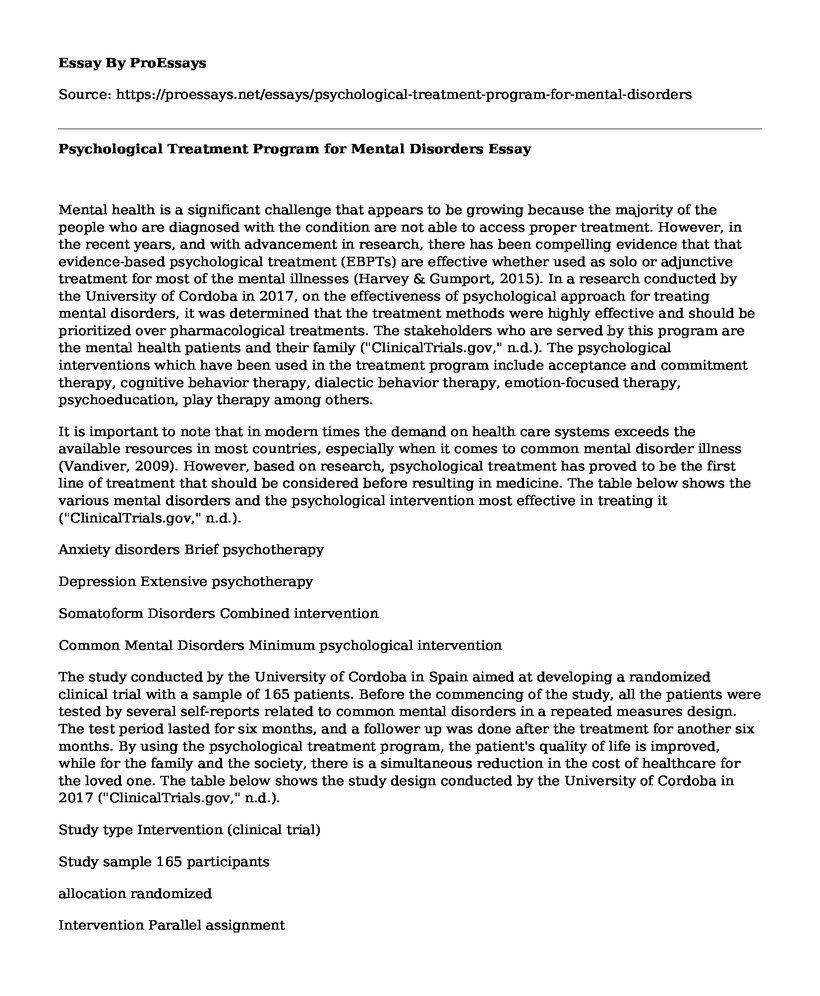Mental health is a significant challenge that appears to be growing because the majority of the people who are diagnosed with the condition are not able to access proper treatment. However, in the recent years, and with advancement in research, there has been compelling evidence that that evidence-based psychological treatment (EBPTs) are effective whether used as solo or adjunctive treatment for most of the mental illnesses (Harvey & Gumport, 2015). In a research conducted by the University of Cordoba in 2017, on the effectiveness of psychological approach for treating mental disorders, it was determined that the treatment methods were highly effective and should be prioritized over pharmacological treatments. The stakeholders who are served by this program are the mental health patients and their family ("ClinicalTrials.gov," n.d.). The psychological interventions which have been used in the treatment program include acceptance and commitment therapy, cognitive behavior therapy, dialectic behavior therapy, emotion-focused therapy, psychoeducation, play therapy among others.
It is important to note that in modern times the demand on health care systems exceeds the available resources in most countries, especially when it comes to common mental disorder illness (Vandiver, 2009). However, based on research, psychological treatment has proved to be the first line of treatment that should be considered before resulting in medicine. The table below shows the various mental disorders and the psychological intervention most effective in treating it ("ClinicalTrials.gov," n.d.).
Anxiety disorders Brief psychotherapy
Depression Extensive psychotherapy
Somatoform Disorders Combined intervention
Common Mental Disorders Minimum psychological intervention
The study conducted by the University of Cordoba in Spain aimed at developing a randomized clinical trial with a sample of 165 patients. Before the commencing of the study, all the patients were tested by several self-reports related to common mental disorders in a repeated measures design. The test period lasted for six months, and a follower up was done after the treatment for another six months. By using the psychological treatment program, the patient's quality of life is improved, while for the family and the society, there is a simultaneous reduction in the cost of healthcare for the loved one. The table below shows the study design conducted by the University of Cordoba in 2017 ("ClinicalTrials.gov," n.d.).
Study type Intervention (clinical trial)
Study sample 165 participants
allocation randomized
Intervention Parallel assignment
Masking Double ( care provider, investigator)
Primary purpose treatment
Official title Brief Evidence-based Psychological Treatments for Common Mental Disorders. A Randomized Clinical Trial in Primary and Secondary Care.
Study start date January 15, 2017
Completion date January 15, 2018
In the case of generalized anxiety disorder (GAD), the time frame before tangible results could be recorded was at 12 weeks. Using the scores of 5, 10 and 15 to represent mild, moderate and severe anxiety it was determined that by the 12th week, the success rate of treating the disorder was at 89% ("ClinicalTrials.gov," n.d.). To arrive at this conclusion; the researchers employed the qualitative method of evaluation where the results were tabulated based on the auspicious number of patients who were treated. The assessment was done using the questioners administered to the patients, observation and conducting tests to the patients to monitor the health improvement of the patients (Vandiver, 2009).
In conclusion, this research is an eye opener on the new yet more effective treatment programs in mental health. I have learned that by using psychological intervention, there is a simultaneous and almost instant impact on the client and the society at large. Psychological treatment helps the health provider understand the underlying issues in a patient and thus help them overcome these challenges, this strengthens the doctor-patient relationship, and it is cost saving for the family of the patient (Harvey & Gumport, 2015). On the other hand, by using the quantitative approach to analyze the effectiveness of the program, I have learned essential techniques of gathering data and analyzing the information to obtain a textured description of the individual, family and the community.
References
Brief Evidence-based Psychological Treatments for Common Mental Disorders - Full Text View - ClinicalTrials.gov. (n.d.). Retrieved from https://clinicaltrials.gov/ct2/show/study/NCT03286881#armgroup
Harvey, A. G., & Gumport, N. B. (2015). Evidence-based psychological treatments for mental disorders: Modifiable barriers to access and possible solutions. Behaviour Research and Therapy, 68, 1-12. doi:10.1016/j.brat.2015.02.004
Vandiver, V. (2009). Integrating Health Promotion and Mental Health: An Introduction to Policies, Principles, and Practices. New York, NY: Oxford University Press.
Cite this page
Psychological Treatment Program for Mental Disorders. (2022, Nov 23). Retrieved from https://proessays.net/essays/psychological-treatment-program-for-mental-disorders
If you are the original author of this essay and no longer wish to have it published on the ProEssays website, please click below to request its removal:
- Paper Example on Personal Strengths and Challenges and Plan of Action Task Elements
- Forensic Accounting: Trends in the Profession Annotated Bibliography
- Essay on US Govt's WWII Decision to Draft Japanese-Americans: Justified?
- Parents of ASC Pupils: Supported by School Staff in EHCP Reviews - Essay Sample
- Essay Example on the Notorious Serial Killer - Ted Bundy
- Essay Example on the Impact of Technology on Human Cognition
- Book Review Example: Reconstructive Memory: Impacts of Cognitive Processes







